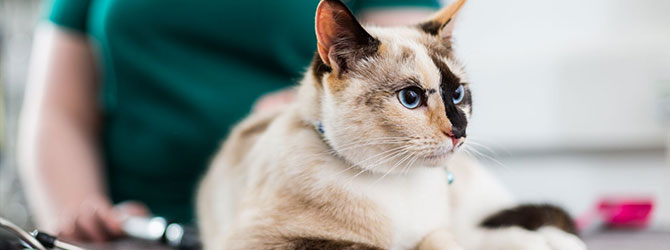Cat pregnancy: how to tell if your cat is pregnant
4 min read
If you have decided not to get your cat spayed, you may be considering breeding from her. This can be an exciting time! This article is designed to give you information on how to ensure everything runs as smoothly as possible and what to do if any difficulties arise.
It is a good idea to book your cat in with your vet for a check-up prior to breeding to ensure she is in good health. Your vet can also advise you on any specific genetic tests recommended prior to breeding; the tests recommended will depend on the breed of cat that she is.
Your vet can give you information on how to maximise the chance of a successful mating, how to tell whether your cat is pregnant and what to do when the big day arrives.
Is my cat pregnant?
Common signs of pregnancy in cats include:
- Red, enlarged or swollen nipples – known as ‘pinking up’
- No signs of coming into heat displayed
- Vomiting early on in the pregnancy
- Slight mucus discharge around a month after mating
- Swollen tummy and gradual weight gain
- Occasional loss of appetite and subdued behaviour in the early stages
- Increased appetite in the later stages – you’ll need to increase her feed during this stage of pregnancy
- Nesting behaviour
Did you know… It’s important not to touch your cat’s tummy when she’s pregnant, as this can damage her unborn kittens.
The next step is to make an appointment with your vet. Your vet will give your cat a thorough clinical examination. They may be able to detect the pregnancy by gently palpating your cat’s abdomen to see if there are any kittens in her womb. If this is inconclusive an ultrasound can be performed from around day 20 to identify the kittens and see their heart beats. It is not possible to accurately determine how many kittens your cat is carrying but you should get an idea of how many to expect.
How long are cats pregnant?
A female cat that hasn’t been neutered will be in heat several times a year throughout their lifetime, from spring to autumn. The average feline pregnancy lasts for around two months – that’s 60 to 65 days from conception to birth.
Remember that cats can become pregnant from as young as four months – when they’re still kittens themselves – so it’s important to have your cat spayed close to this age if you want to prevent pregnancy.
Top tips to care for your pregnant cat
- Take her to the vet early on in the pregnancy
- Feed her kitten food throughout the pregnancy
- Increase the amount of food you provide during pregnancy – she will probably need to eat one and a half times more than usual – your vet will be able to advise on the best diet and quantities
- Examine your cat for fleas, ticks and other parasites, as these can harm her unborn kittens
- Pregnancy can be tiring for your cat, so it’s normal for her to be less active, and to need more rest than usual
- A pregnant cat should be wormed but you should discuss with your vet which product to use as some wormers can be harmful to the kittens
- Keep her inside as her due date approaches so that you can keep a close eye on her
- When she is in labour although it is important to monitor her for signs of complications try to give her some privacy and keep the environment calm and stress free. Try not to interfere unless you are concerned that there may be a problem. In this instance it would be sensible to contact your vet for advice.
Warning signs in a pregnant cat
Always contact your vet if you notice any of the following signs that your cat may be struggling with pregnancy:
- Loss of appetite for more than 24 hours
- Persistent vomiting
- Raised temperature
- Lethargy or depression
- Dark or unusual vaginal discharge
- Active straining for longer than 60 minutes without a kitten being born
- A kitten visible in the birth canal for longer than ten minutes
Additionally, after the labour you should contact your vet if the kittens are not suckling from their mum or seem weak, agitated or distressed. You should also contact your vet if your cat has any swollen, red or painful nipples.
Preparing for labour in your cat
Most cats handle pregnancy and labour with no problems and no interference. That said, it’s good to be close by when the big day arrives, so you can step in and call the vet should anything unexpected happen.
Keep your cat inside during the last couple of weeks of pregnancy, as it’s important that she doesn’t give birth outdoors.
A common sign that she is close to giving birth is withdrawn behaviour and seeking out somewhere quiet towards the end of their pregnancy. You can help her by providing a cosy birthing box in a warm, secluded area, complete with old towels, blankets or shredded paper. Ensure that her food, water and litter tray are close by.
Once your cat has given birth, continue to feed her kitten food until after she finishes nursing her new offspring.
Important note
It’s quite possible for your cat to become pregnant again just six to eight weeks after giving birth. With animal shelters overrun with cats desperately in need of a good home, please think carefully about neutering. Your vet will talk you through the treatment options available.
“The average feline pregnancy lasts for around nine weeks – usually 60 to 65 days from conception to birth.”
Expert advice on cat pregnancy
For expert advice on cat pregnancy, and what to expect when your cat’s expecting, get in touch with your local vet.
Find your nearest vet using our Find a Vet page, or speak to a vet online using Online Vets.

